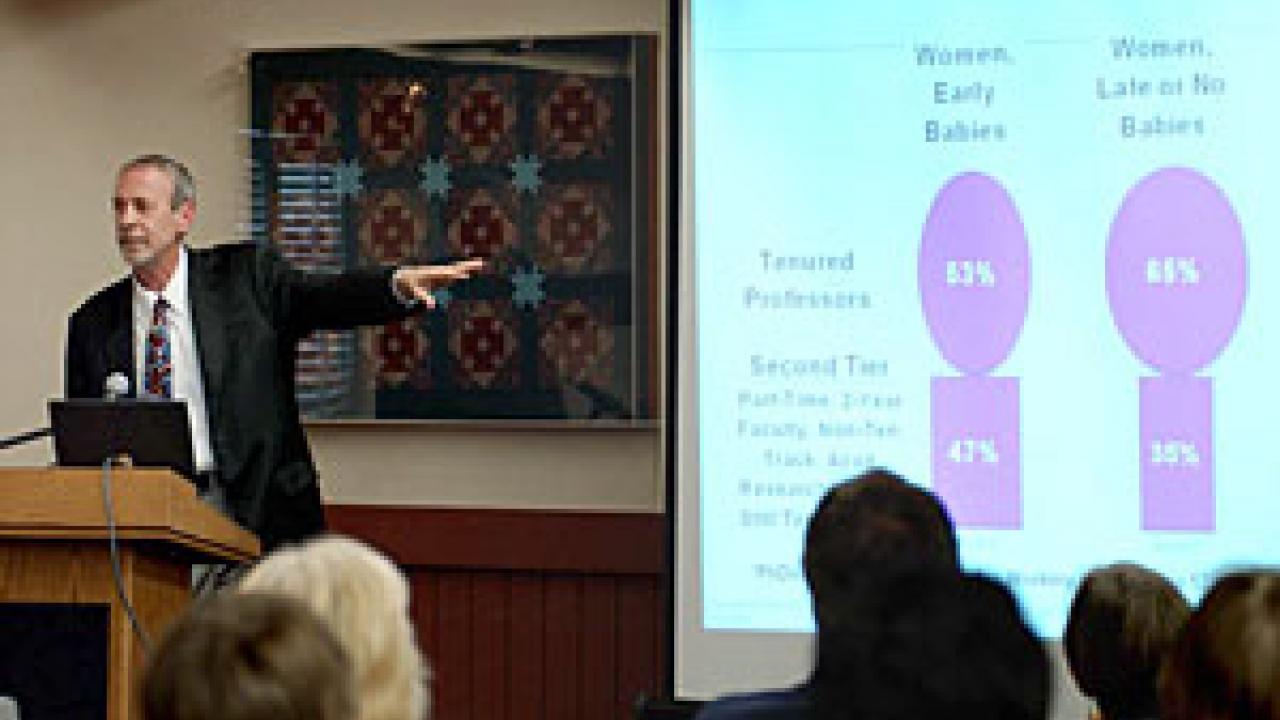Work-life balance is for everyone, says Robert Drago, a professor of labor studies and women's studies at the Pennsylvania State University.
Drago spoke to a crowded room of faculty and staff members April 1 in the Cabernet Room in the Silo. His talk was titled, "Work, Family and Life in the Academy: Challenges Facing Faculty, Students and Staff and Opportunities for Change."
A leading researcher in the field, Drago presented some extensive research regarding work-life issues and examined how higher education approaches the issue through its policies, perceptions and strategies. And he talked about how to maintain a healthy balance between attending graduate school and living life.
"My sense was that he was able to identify issues that still challenge institutions," said Dennis Shimek, senior assistant vice chancellor of Human Resources. "He also discussed how faculty deal with real-life situations that require a balance between work and other demands. Although his talk was primarily on faculty, I believe that he opened our eyes to the same issues on the staff side."
Shimek said work-life balance is more than having policies. "It's really about practices and the support that is given by management to realize the benefits of work-life strategies."
Shimek noted Drago described UC Davis as one of the more "progressive" institutions in the area of work-life balance.
"I am encouraged by his talk and a renewed awareness of the issues," he said.
"I fully intend to continue our efforts on the staff side and bring interested persons together to review what we are doing and what we need to do in the future. We are very much committed to a positive and supportive work life program at Davis.
As women continue to enter the academic workforce in increasing numbers, Shimek said, the ability of UC Davis to recruit and retain an outstanding and diverse faculty will depend on having strong support systems for issues related to work life balance.
Moreover, with more men and dual-career couples participating in the rearing of their children, programs such as childbearing leave, parental leave and modified duties will facilitate recruitment and retention of the best faculty to UC Davis.
Cristina González, senior advisor to the chancellor, said that as Chancellor Vander-hoef pointed out in his introduction of Drago, UC Davis is actually ahead of most, perhaps all, major universities in this area.
"Our efforts to improve conditions for staff were recognized by HR Magazine, and our new policies for ladder faculty have been mentioned by the Chronicle of Higher Education," said González.
She said a recent system-wide survey of ladder faculty shows Davis as the "most family-friendly campus in the system." She also noted that the university's campus task force on work-life balance for ladder faculty is now going to have a systemwide counterpart in the Advisory Committee on Family-Friendly Policies for Ladder Faculty that has just been appointed by UC President Robert Dynes.
"Davis is really leading the system in this area," González added.
Drago's talk was co-sponsored by the Office of Academic Personnel, Office of Administration, Office of Campus Community Relations, Offices of the Chancellor and Provost, Office of Graduate Studies, Postdoctoral Scholars Association, Consortium for Women and Research, Women's Resources and Research Center, Student Affairs and the Graduate Student Association.
"The long list of co-sponsors of this event, including student and post-doc organizations, indicates how widespread interest in this topic is on this campus," González said.
